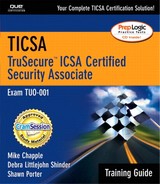Computer Ethics
Identify, specify, or describe computer and network ethical, legal, and privacy issues.
Discuss the role of ethics in computer security.
Whereas laws impose external controls on behavior, one's personal ethics, or system of moral principles, impose internalized rules governing what is or isn't appropriate conduct.
In addition, many occupational or professional organizations adopt codes of ethics that provide rules or guidelines their members are expected to follow in conducting business. Although violations of the ethics code do not generally result in legal sanctions as does violation of law (although, of course, some acts are both criminal and unethical), such violations can result in loss of professional licenses or certifications, or censure or expulsion from the professional organization or association.
Ethics address not what is legal or illegal, but what is morally right or wrong.
Professional Codes of Ethics
Codes of ethics adopted by organizations, such as the American Society for Information Systems, the Association of Independent Information Professionals, and others, generally address such matters as
Responsibility of members to employers or clients. Includes respecting clients' privacy and not misusing or disclosing confidential information obtained in the course of work; keeping clients informed and not withholding information that clients have a right to know; avoiding conflicts of interest; charging fair and reasonable fees for services
Responsibility of members to their profession. Includes not misrepresenting themselves or their credentials; not making false statements to obtain work; not taking on assignments for which they are not qualified; maintaining current competency; not behaving in a way that will discredit the profession
Responsibility of members to society. Includes providing services and treatment of others without bias or prejudice; ensuring that employees and subordinates comply with legal and ethical standards
Because computer security specialists are often given access to sensitive data, many ethical issues center on privacy and nondisclosure.
Why Ethics Matter
Practically speaking, unethical behavior can result in damage or destruction of one's career, but unethical behavior reflects not only upon the individual, but on the profession as a whole.
Relationship of Ethics and Professionalism
A code of ethics is part of a larger entity, professional conduct, which also covers professional appearance, punctuality, and manners.
Those occupations that are thought of as professions—medicine, law, teaching, and engineering—are distinguished not only by the formal training required and government regulation/licensing, but also by the fact that they have established codes of ethics and organizations or associations that enforce those codes.
Working with Unethical Consultants
It is easy for consultants to engage in unethical behavior, such as “padding” their expense charges, or selling confidential information obtained by working for one client to another, competing client.
Ethical professionals not only don't engage in such behavior themselves; they don't tolerate it in others. When such unethical practices are discovered, they should be reported to the affected parties and to professional associations (if applicable).
Unethical consultants may profit in the short term, but are almost always found out in the long term, and gain a reputation that cannot be overcome. Those who continue to work with or associate with them will also be tainted by the same bad reputation even if their own behavior was beyond reproach. Unethical consultants who violate the law or cause harm to others when working for you can also subject you or your company to criminal or civil liabilities.
